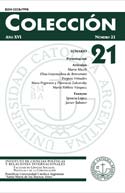Walter Benjamin and Hannah Arendt: the notion of historical time and the task of the historian
Keywords:
History, Historian, Dialectics, Storytelling, ReconciliationAbstract
The aim of this work is to show Hannah Arendt’s selective appropriation of Walter Benjamin’s thoughts concerning historical time and the task of the historian. As regards the former, the tradition of the oppressed, supported by Benjamin, establishes a renewed view of historical events. This thesis can be found in Arendt’s glorification of the lost revolutionary tradition. As regards the latter, the epic shifts to historiography and this one to chronicle, as shown in “The Storyteller. Reflections on the Work of Nikolai Leskov”. This shift can be seen in Hannah Arendt’s critical approach to the modern concept of History, as an embracing process within which events become meaningful at the expense of its uniqueness. The peculiar nature of the category of action, outlined in The Human Condition, is the key to understand the notion of history, opened to successive re-appropriations and re-interpretations, precisely because it is a truth implanted in a human world.Downloads
Download data is not yet available.
Downloads
Published
2017-11-24
How to Cite
Goyenechea de Benvenuto, E. (2017). Walter Benjamin and Hannah Arendt: the notion of historical time and the task of the historian. Colección, (21), 39–64. Retrieved from http://200.16.86.39/index.php/COLEC/article/view/851
Issue
Section
Research Articles
License










 Colección
Colección